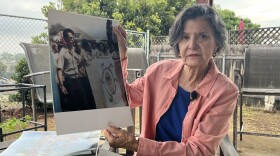Hours after they had been rescued, workers who survived an explosion on an oil rig in the Gulf of Mexico were asked to sign form letters about what they had seen and whether they had been injured.
Lawyers for the oil rig's owner, Transocean, requested that workers who had survived the blast sign the form in the wake of the April 20 blowout on the Deepwater Horizon. This was hours before the workers had been allowed to see their families.
Now some of those survivors say they were coerced and that the forms are being used against them as they file lawsuits seeking compensation for psychiatric problems and other injuries from the blast.
"The form that they made them sign had, 'I was here when it happened, I didn't see anything.' Or 'I saw this and I was or was not hurt,' " says Steven Gordon, a Houston attorney who represents some of the survivors.
It's a pre-printed form letter. The surviving rig worker was asked to fill in the date, his name and address and where he was at the time the evacuation was ordered.
Then there are the two paragraphs at the end.
One says: "I was not a witness to the incident requiring the evacuation and have no first hand or personal knowledge regarding the incident."
The second says: "I was not injured as a result of the incident or evacuation."
The men were asked -- if they agreed -- to initial those statements.
Documents show those initials now are being used against the survivors as they file lawsuits seeking payment for emotional distress and other claims. Gordon says "When we were hired by one of the survivors, we gave notice to Transocean's lawyers. And the immediate response was, 'Wow, we're surprised. Here's a statement that says he's not hurt.'"
Gordon and attorney Kurt Arnold each have one client who has received letters from Transocean in the past few days.
Arnold says asking the men to sign those forms was coercive. He says the request came more than 24 hours after the rescue, after the men had seen 11 of their friends die in the explosion and chaos of that night, and after they had run to lifeboats to try to save their own lives.
Arnold's clients aren't speaking publicly but have described the scene to him. "It's extremely gruesome," he says. "I mean, one of the guys told me that as he's running out, there's guys burning and some guys missing limbs. It's like a war zone."
Arnold and Gordon say the survivors were kept on the water, in boats and on another rig for 15 hours or more. The explosion on the rig happened at about 10 p.m. on Tuesday, April 20. "They did not bring them in till 3 a.m. Thursday morning," Gordon says.
When they did get to shore, he says: "They were zipped into private buses, there was security there, there was no press, no lawyers allowed, nothing, no family members. They drove them to this hotel and they escorted them into the back of this hotel, once again under escort."
It would be many hours more, according to lawyers and survivors, before they could see family and, for many, even telephone loved ones to say they were safe.
Secluded at a hotel, they were questioned by company consultants and investigators. And given the form to sign.
Arnold says it only added to his client's emotional distress. "Talking about adding to post-traumatic stress. Don't take them in once you get 'em off the rig. Just keep 'em there for 15 hours so that they can watch, watch their rig burning up, knowing they had to leave some of those guys behind. I mean come on. Really? Was there any reason for that?"
But Arnold thinks it was very deliberate. "The reason they were doing that, I think, is so they could assemble their teams onshore of investigators so that when they got to the hotel room they could try to get these guys to sign statements and such before they'd even let them go to bed. That's what they did. Unbelievable."
Other legal experts said the tactic of such letters is extreme but not unheard of -- and that courts may question them. Says Robert Anderson, who teaches maritime law at Pepperdine University School of Law in California: "I think the court would respond very skeptically to a waiver of any type of these basic rights where the seaman was acknowledging that he or she was not injured or suffered no damages or otherwise was releasing the employer, particularly if that waiver was executed in the wake of a rescue at sea."
NPR contacted Transocean and the company sent a response by e-mail. "From the beginning," the response says, "our focus has been on the crewmembers and their families, working with all parties in the response efforts and conducting a Transocean investigation into the incident. At this time, it would be inappropriate to comment on litigation."
Copyright 2022 NPR. To see more, visit https://www.npr.org. 9(MDAzMjM2NDYzMDEyMzc1Njk5NjAxNzY3OQ001))






